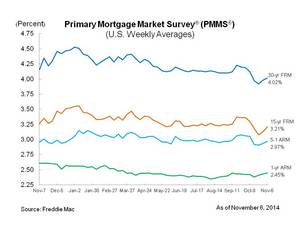MCLEAN, VA--(Marketwired - Nov 6, 2014) - Freddie Mac (
News Facts
- 30-year fixed-rate mortgage (FRM) averaged 4.02 percent with an average 0.5 point for the week ending November 6, 2014, up from last week when it averaged 3.98 percent. A year ago at this time, the 30-year FRM averaged 4.16 percent.
- 15-year FRM this week averaged 3.21 percent with an average 0.5 point, up from last week when it averaged 3.13 percent. A year ago at this time, the 15-year FRM averaged 3.27 percent.
- 5-year Treasury-indexed hybrid adjustable-rate mortgage (ARM) averaged 2.97 percent this week with an average 0.5 point, up from last week when it averaged 2.94 percent. A year ago, the 5-year ARM averaged 2.96 percent.
- 1-year Treasury-indexed ARM averaged 2.45 percent this week with an average 0.4 point, up from last week when it averaged 2.43 percent. At this time last year, the 1-year ARM averaged 2.61 percent.
Average commitment rates should be reported along with average fees and points to reflect the total upfront cost of obtaining the mortgage. Visit the following links for the Regional and National Mortgage Rate Details and Definitions. Borrowers may still pay closing costs which are not included in the survey.
Quotes
Attributed to Frank Nothaft, vice president and chief economist, Freddie Mac.
"Mortgage rates continued to rise this week with the 30-year fixed-rate mortgage eclipsing the 4 percent mark. The rate increases coincide with real GDP beating consensus expectations of 3.0 percent growth by growing at an annualized rate of 3.5 percent in the third quarter. The ISM Manufacturing Index also beat expectations registering 59 in October, up from September's reading of 56.6."
Freddie Mac was established by Congress in 1970 to provide liquidity, stability and affordability to the nation's residential mortgage markets. Freddie Mac supports communities across the nation by providing mortgage capital to lenders. Today Freddie Mac is making home possible for one in four home borrowers and is one of the largest sources of financing for multifamily housing. Additional information is available at FreddieMac.com, Twitter @FreddieMac and Freddie Mac's blog FreddieMac.com/blog.
